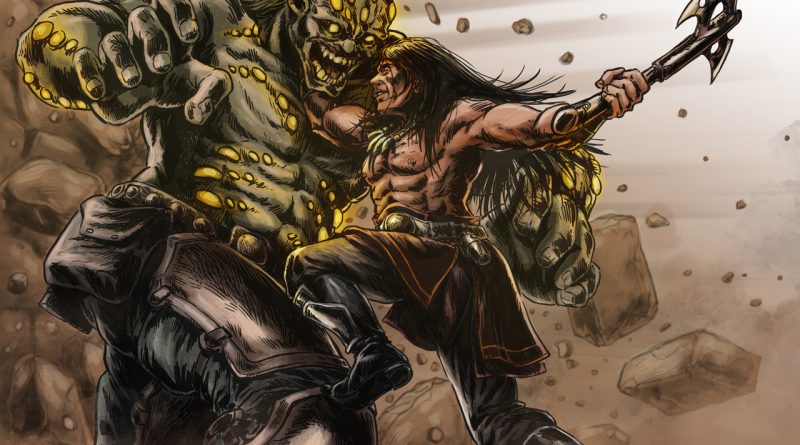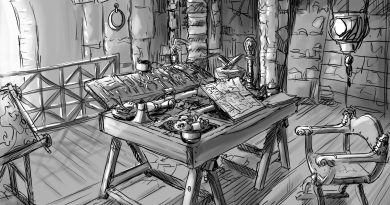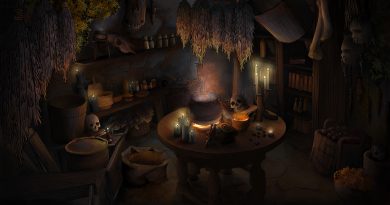6-The Virtues
“So it’s no longer a demon Loss Singer?”
“Never was to me. I’ve seen real demons. They’re human; they’ve lost all their Virtue, gone mad with a taste for blood, vice, power and gold. They are demons by their actions, not their nature. As for her, she’s just a kid born with a cursed power, and she’s done nothing but use it to save people. Besides… why did she take the risk of using her Singer’s power? We know you never gave her that order.”
“Because she could. And I never forbade her to do so.”
The Songs of Loss, Melisaren
The Virtues
Lossyans generally consider only three elements to make up the world, and three virtues: Earth, which is Honor; Fire, which is Courage; and Water, which is Wisdom. One virtue remains, long since lost like its element, Air: Faith. Air is everywhere, but invisible, and is no longer considered an element, except by alchemists. As for Faith, we’ll come back to it at the end of this chapter.
Depending on the people, there are four or even five or more elements, including wood, metal and emptiness. But this approach to the Three Virtues is ancient, predating the Church. Lossyan respect for the Three Virtues is so strong that it surpasses religious rules and is integrated into all customs and laws. It defines the notion of humanity. To be deprived or lacking in any of the Three Virtues is to be more animal than human, and above all to be denied the universal rights of Lossyans. Even the most exotic or barbaric peoples respect these principles, everywhere around the Seas of Separation, and we know no people who do not adhere to these principles.
We will now describe in detail these virtues, the social and moral cement of the Lossyans.
1 – Honor, the Earth
Earth is stability, righteousness, assurance, the source of birth and home. It is Honor: Honor is the act of acting first and foremost by virtue of one’s convictions, in line with the principles shared by one’s group, one’s people, the believers of one’s religion. Honor is a code of conduct shared by the community: it is earned by deeds admired by the community, and lost by humiliations reprobated by one’s own. Of the three virtues, Honor is the most visible, and the most public: it cannot be hidden or secret.
Honor is what defines a lossyan socially. Without honor, he has no word and cannot be trusted or relied upon: he is vile. He will no longer be supported, and will be shunned, despised and rejected by his own kind, to the point of ostracism and contempt.
Honor being a social and public virtue, it depends on the character’s culture of origin, but the following principles are considered by all to be honorable:
- One’s word cannot be taken back: swearing, promising or making a deal cannot be undone without the agreement of the person concerned. Betraying an oath or a deal is a terrible offense for a lossyan.
- Serve only one Master: a lossyan accepts only one allegiance at a time. If he serves a lord, a patron or a protégé, he has no other allegiance than this one, and he will never betray it. To betray one’s allegiance is an unforgivable offense for a lossyan.
- Assuming responsibility for one’s actions: committing an error, a misdemeanor or a crime is the sole responsibility of the person at fault, including through negligence or imprudence, even if he or she is the victim. Individual responsibility takes precedence over rules, laws and decrees. So you’d be hard-pressed to pity someone on Loss for having to pay the consequences of his or her actions. To deny one’s responsibility, or even worse, to lie or try to cheat in order to shift the blame onto others, is a dishonor.
- To suffer without complaining, to die without begging: to be able to do this is greatly respected by Lossyans, who will easily despise those who whine and beg, all the more so if the latter are combatants.
- Open your door to strangers, respect your host’s home: respect the codes and principles of hospitality. Lossyans always share soup, a fireside and a straw mattress with the traveler. The traveler will be all the more honored if, in exchange, he does a favor or leaves a present, even a symbolic one, for his hosts. Not opening one’s door to a traveler is frowned upon, even if in the most remote places, or in times of war, this rule is rarely respected.
- Do not let an offense go unpunished: the notion of offense depends on the susceptibility of the victim and the seriousness of the crime. Lossyans may well insult each other like carter or rip each other off without taking offence, while others will take too insistent a look as an offense. But when a lossyan suffers an offense, he must make it pay, especially if it took place in public.. A man can quickly lose face by not responding to an offense, especially if it’s serious and well-known. Reparation rarely leads to death, but it does happen.
- Respect life, all the more so when it’s young: Lossyans don’t like killing, and if they can solve the problem in some other way, they’ll prefer to find an alternative, including forced labor and enslavement. Gratuitous slaughter, torture and sadistic crimes are frowned upon. In particular, Lossyans consider children sacred: attacking or killing them is absolutely unforgivable.
- Obeying the Church of the Council and its Ordinatorii: even if it’s far from a constant, the majority of Lossyans are superstitiously respectful of the Church of the Council and its representatives, the Ordinatorii. Even if this is widely contradicted in practice, every Lossyan considers it honorable to respect an Ordinatori. The idea that they could be attacked is frightening for most Lossyans.
2 – Courage, the Fire
Fire is energy, vivacity, strength and rebirth; it is Courage. Courage is overcoming fear to face danger. Courage requires fear, for it is fear that gives rise to the virtue of Courage, unlike boldness or temerity, which are dictated by desire, envy, pride or lack of survival instinct. Courage is not easily guessed, as it takes a situation of danger and the determined need to overcome fear, for Courage to appear.
Courage is a highly respected virtue among Lossyans. It is honorable for them to face up to danger when necessary, and to show cowardice is the sign of unforgivable weakness. Some points of the notion of Courage are universal on Loss:
- Do not fear death: this is a constant in the Lossyan mentality: death comes to all, and fearing it, begging for it, and complaining about it is proof of cowardice in the face of every living being’s ultimate test. Nevertheless, all Lossyans will do their best to stay alive. Seeking death is for them a waste and, in some cases, an ultimate dishonor. Suicide, except in the case of a dying person or someone totally dishonored and rejected by all, seems inexplicable.
- Being stoic in the face of suffering: lossyans find it cowardly to beg and complain about their suffering. Tears as an expression of emotion are quite natural for them, and some would even look strangely at a man who would shed no tears at the death of a loved one or at an emotional reunion. But you have to be stoic in the face of pain, and show that you have the courage to bear it without complaint.
- Confronting the enemy: a lossyan does not flee by dropping his weapons on the battlefield. This is an unforgivable demonstration of weakness. Lossyans do their utmost not to run away or surrender without fighting to the bitter end. But they know how to retreat and surrender if the situation is desperate or defeat is obvious. Faced with a threatening man, a lossyan will not back down. Nor will they allow a victim to be molested without intervening.
- Exploring new paths: Lossyans are superstitious; moreover, the Dogmas of the Council consider certain areas of research, such as the study of artifacts and the Ancients, to be heretical. Yet it is virtuous for a Lossyan to explore the unknown. Curiosity and a thirst for discovery are important, even if it means defying the Church.
- Facing danger for others: Lossyans do their best to come to the aid of others in danger, within their means, but will always try to intervene and lend a helping hand. Faced with the perils of the dangerous and cruel world of Loss, courage also means taking the risk of reaching out and offering help, even to one’s enemy.
- Kill when you must, spare when you can: courage is also about choosing when to give death, or not. It is said that it is sometimes braver to spare an enemy than to finish him off. In the same way, giving death is an act of charity that must be assumed: if someone is in the greatest distress, whether physical or moral, the lossyan will consider that the most charitable act would be to give him death.
3 – Wisdom, the Water
Water is calm, the incoercible movement that bypasses all obstacles, the mirror that reflects the self, the depth of abysses, the serenity of the force that takes its time to bring down the most solid foundations. She is Wisdom. Wisdom is the act of conforming to an ethic, often common to one’s community, which combines awareness of oneself and others with temperance, thoughtful prudence, sincerity and discernment, in order to base judgment on an enlightened and reasoned view of things. It’s a virtue that’s easy to identify with, despite the fact that it remains intimate to the person who uses it.
A man without wisdom is impulsive, sanguine and hot-tempered. He is thoughtless, and must bear the consequences of his ill-advised decisions more than anyone else. Lossyans will have little pity in calling him a fool, and will give him no credit. Here are a few universal points of wisdom as seen by Lossyans:
- Think before you act: the wise Lossyan is noted for his ability to temporize his actions in order to weigh up and anticipate their consequences. This is also the quality of a cunning man or strategist, who must decide on his choices and think through the consequences in advance.
- Listen before you speak: a wise man will be well advised to listen to his interlocutor in order to learn more about his real intentions or the situation. This is an important quality for the wisest of politicians, but also for the most cautious and cunning of slaves.
- Choose your words, for words are power: Lossyans have a saying that an arrow can pierce a heart, but a speech can touch a thousand. The art of discourse and mastery of rhetoric can change the destiny of a city, and a wise man will be wise to know how to choose his words and be careful how they are used. Lossyans have great respect for the art of discourse, and are all aware of its power.
- Teaching and passing on: wisdom also means giving others something to learn. The wise man passes on his knowledge and his enlightened vision of the world. The Lossyans say that wisdom is the only treasure whose value increases the more it is distributed.
- Keep an open mind: the wise man is always learning, including innovative ideas, as long as they appear reasonable. A wise man knows that there is always something to learn from others, whether from their successes or their failures. A wise man is therefore always inclined to listen to new ideas.
- Never take anything for granted: the final principle of wisdom is not to remain convinced of one’s own knowledge and opinions. A wise man admits to questioning himself, so that he is always led to reflect on and question his own achievements. This is a dangerous trait, and one that the wisest man will use with discernment and discretion. For questioning things can lead to questioning the Sacred Precepts of the Church of the Council.
4 – The Lost Virtue
Before the Long Winter, there were four elements, and four Virtues. And the fourth, now lost, was Air: Faith. For Lossyans, there are now only three elements, because air doesn’t count, since it can’t be seen; it’s a bit like emptiness, nothingness, something without mass that has no effect on the real world. As for faith, there is only fidelity and obedience in the Church of the Council.
Faith as defined below is therefore very rare. It is the virtue of shamans, Loss singers and very rare spiritualist peoples. Even Dragensmanns and Foresters are generally uninterested in this notion and, if they know of its existence, don’t value it at all, which is what makes it so specific and strange to all Lossyans.
AIR, FAITH
Air is immaterial and intangible; it can’t be seen, but it can be felt. It cannot be touched, but affects everything. It spreads everywhere, invisible but present in everything. It is Faith: Faith is the concept of trust in that which has no verifiable existence through the senses, experience or material proof. For Lossyans, it is honorable to trust and to give one’s trust. But for those who know Faith, it is beyond all virtues, it is absolute and blind trust. It is sacrifice and devotion, and finally, it touches the very essence of spirituality and self-giving. It is unconditional love.
It’s a virtue incomprehensible to most Lossyans. The idea that trust, sacrifice and love transcend other virtues and become absolute self-giving is foreign to them, and even heretical to immaterial concepts or divinities. However, for certain peoples, such as the Dragensmanns, the Erebs or the San’eshe, the concept comes as no surprise to them, from their most devoted priests, shamans and ascetics.
Here are some of the general principles of Faith:
- Give without expecting to receive: Faith expects no reward. Those who follow this virtue cannot conceive of asking for the fruits of their devotion, love and acts of faith to be returned to them. He may, of course, wish to attract the consideration of the object of his fervor, but he does not expect the latter to reward him in return.
- To love without counting the cost: There is no limit or count to the acts of devotion and love that the lossyan is capable of performing towards the object of his Faith. He loves and worships sincerely and without the slightest doubt. The lossyan will not look at the price he pays for loving and worshipping.
- Blind trust: everything that comes from the object of one’s Faith cannot be questioned, whatever its commandments, deeds or intentions. The lossyan following this Virtue could never imagine doubting the object of his unconditional love, and will not easily realize if the latter is lying to him, deceiving him, or acting against his good.
- Accepting to risk everything: the risks involved in serving, joining or finding the object of one’s Faith do not count. All that is material weighs little against devotion. The lossyan who follows the Virtue of Air can show courage and recklessness beyond all reason, for the benefit of the object of his Faith.
- Considering things as absolute: just as a lossyan could never question his faith and devotion, it cannot be measured, and is limitless. This fervor transcends the material world and survives death. Those who believe so powerfully have no fear of suffering or doubt. The message of Faith, its commandments, its advice, its wisdom or folly are absolute, and vain are the efforts to change the mind of one who loves with such devotion.
- Sincerely express your faith: those who love and revere do not hide it, unless circumstances require it. It’s obvious to him that his Faith flows from the source, and he will defend it and declare it sincerely, refusing to repudiate it, whatever the cost, because that would be a betrayal of his own soul.
5 – Three virtues, three elements, three forces
For Lossyans, the three virtues form the whole of the constituents of being, since they are also elements; we therefore have a first triptych: Earth, Fire and Water, which form a second triptych as virtues: Honor, Courage, Wisdom. But for Lossyan philosophers, there’s a third, which encompasses the entire construction of the world: Voice, Body, Spirit.
- Honor is a social virtue, and the Earth is therefore the source of Honor, and represents it. It is the Voice.
- Courage is born of the decision to act. Action is Fire, and Fire is what drives movement. This is the Body.
- Finally, Wisdom is a spiritual virtue: reason is born of the passage of time, temperance of the ability to let movement take its course, as Water does. This is the Spirit.
Air, the entity of the Song of Loss
Air is associated with Faith, and with the last component of the world: the Song of Loss.
Before the advent of the Council, the Song of Loss, now seen as the expression of demonic power and intended to enslave Man, was one of the constitutive elements of reality, an idea now unthinkable and heretical for the Church.
The Song of Loss symbolized primordial energy, that which animates all things and destroys them, the breath of energy without which there is only nothingness. According to this philosophy, still known and shared by shamans, the Song de Loss is the expression of the power that gives movement and existence to all things.




